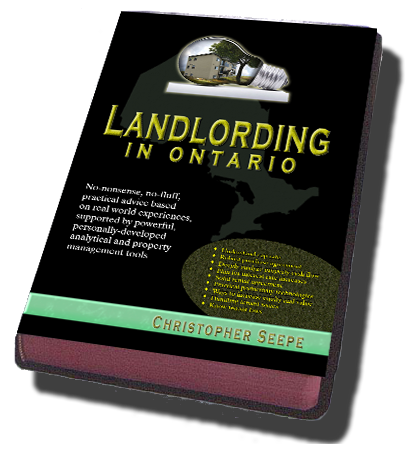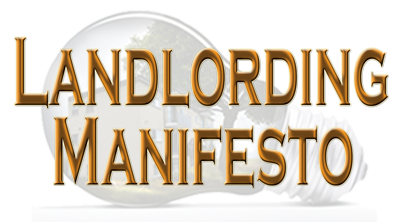|
This Landlord Manifesto is a written statement of the beliefs, aims, intentions, motives, views and policies that set out the collective understanding of what it means to be a private sector residential rental property landlord investing and operating in the province of Ontario, Canada. It is written and published under the current persecutorial residential tenancy laws and practices meted out to private sector landlords by profoundly tenant-biased government at every level. |
| • |
Housing is the foundation of sustainable living without which any society cannot survive or develop. A shortage of housing in an established society represents a significant security threat to all denizens from myriad social ills that arise from homelessness and unfulfilled home ownership aspirations.
|
| • |
We are socially-responsible
operators of a residential rental property
business who willing assume extraordinary
financial and legal risks to provide safe,
reliable, comfortable and healthy housing with
associated amenities, in exchange for a payment
that generates a reasonable profit. Such housed
members become tenants.
|
| • |
Tenants are the customers of our business. We
will treat them in a fair, friendly, and where
necessary, a firm manner, but always with
dignity and respect, even if the tenant does not
reciprocate in kind. |
| • |
We have the inalienable right to receive the
full amount of rent contractually agreed upon
between the landlord and tenant, on or before
the date the rent is due, and in a manner of
delivery and payment mutually agreed upon by the
landlord and tenant. Tenants consequently have a
binding legal obligation to honour all the
agreed-upon terms and conditions of the rental
agreement they signed with the landlord. |
| • |
Like any other business in Canada, we have a
right to earn income that covers all operating
and financing costs and generates a profit that
is commensurate with the financial and legal
risks we undertake, without legislated
limitations on the income our business can earn
or which prevents us from passing on costs to
our customers. |
| • |
We are not social workers or an extension of
government social housing programs, policies,
initiatives and plans. |
| • |
Personal autonomy is not the same as
unconstrained freedom. Landlords, tenants and
governments do not have the right to do as they
please. |
| • |
We have an inalienable right to equality and
parity within a free, open
and democratic society whose fundamental legal,
social and political fabric and principles guarantee equal
rights and equal treatment before the law.
Government has a sworn duty and obligation to
strive for balance whenever possible between the
needs of all stakeholders in any communal
circumstance or issue.
|
| • |
Landlords have a right to proactively engage all
levels of government and their respective
elected representatives to ensure that there are
not two or more judicial, legislative or
bureaucratic standards between tenants and
landlords. |
| • |
Individually and as a community, we advocate sustainable
landlording practices and will work in good
faith with all government agencies and private
sector groups that seek to improve housing
availability and cost-effective building
improvements. |
| • |
(A proper statement needs to be drafted
about slumlords not being tolerated and the
landlord community being proactive in lessening
the effects these types of operators have on the
industry as a whole -- taking lessons from
professional associations like those for
accounting, dentistry, medical, engineers and
surveyors.) |
|
Support Documentation |
|
| • |
Origins of the Housing Crisis and Government Abuses Against Landlords (c) 2017 Chris Seepe
19-page bulleted list of the dystopian legal and financial environment of the Ontario (Canada) landlording profession, created primarily by short-sighted legislation that either seeks to provide additional unwarranted revenue to various levels of government or panders to the large tenant voter base, all at the expense of private sector landlords.
|
| • |
Supply of Private Rental Housing in Canada - Canada's Housing Shortage Solutions of the 1960s and 1970s Tony Crook, 1998
In 1998, the Canadian Federal Government commissioned a U.K. professor to explain why private sector rental housing had grown so quickly in the 1960s and early 1970s and then virtually came to a standstill throughout the mid-1970s and into the late 1990s. I believe you would be astonished to see that arguably 80% of the document reflects exactly the same housing shortage situation and circumstances today as it was in 1998. However, this document explains what government did right to create purchase and rental housing and then what it did to completely destroy that same initiative and growth. IT IS MUST READING if you're interested in thoughts and solutions on how to alleviate the pandemic crisis of private sector purchase and rental housing (including affordable and seniors housing).
|
|
Landlord Training &
Education |
||
 |
Landlording in Ontario real estate BOOK (c) 2017 Chris Seepe
Landlording in Ontario covers everything involved from finding an income-generating property (very difficult in today’s market), assessing its true value, and managing its operation to protecting yourself against tenant abuse and government bias, setting up property legal and accounting structures, embracing the power of digital management, and ultimately extracting value to finance the next property.
Print Version: CA $34.95
Or click here: http://www.lulu.com/shop/chris-seepe/landlording-in-ontario/paperback/product-23109323.html
__________________________________________________________________________________________
|
|
 |
Landlording in Ontario real estate COURSE Landlording in Ontario is a no-nonsense, no-fluff course of the instructor's real world experiences, knowledge, and skills, accompanied by solid practical advice, and supported by home-grown hands-on analytical tools to empower you to make well-informed commercial investment property and ‘landlording’ decisions -- especially properly assessing market value, structuring opportunities so they can be financed, assessing upside potential of an investment property, and managing buyer/seller expectations during negotiations. This course is a firsthand account that focuses on residential rental investment properties (single family home to multi-unit) but applies significantly to retail properties and to a lesser extent to office, industrial, institutional and other types of investment properties. |
|
Landlord Association
To subscribe to our mailing list click on the "JOIN" button below.
You can
unsubscribe anytime by
clicking on the Unsubscribe link found in
every email we send. ![]()
 Chris Seepe |
About Chris Seepe (Author & Instructor)
|
|||||||||||||||

